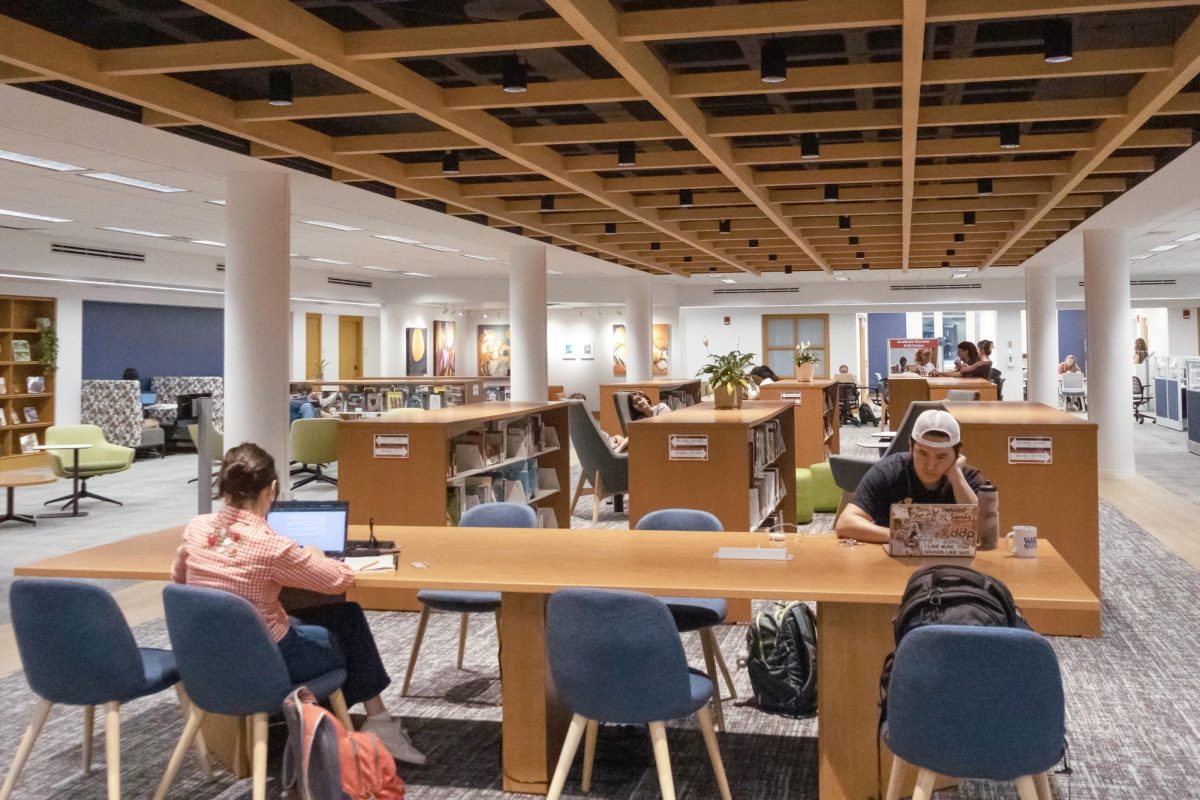This year Macalester students were met with a vastly different COVID policy than the one that they knew last fall. Few students wore masks and many did not test for COVID. Similar infection rates to last fall begged the question: Why the difference?
As Macalester grapples with COVID nearly four years after the onset of the pandemic, there are increasingly more factors in creating COVID policy. Those instituting COVID protocols must weigh student fatigue, state and federal resources and infection rates. Macalester must attempt to meet students where they are and discern what they are willing to do.
Co-Chairs of the Infectious Disease Task Force, Jen Jacobsen, executive director of the Hamre Center for Health and Wellness, and Steph Walters, medical director of the Hamre Center, both provided a public health perspective in the creation of Macalester’s COVID policy. They note that the shift in COVID policy is not due to a difference in attitude, but resources. This semester is the first that the country is no longer officially under a public health emergency, meaning that it is increasingly difficult for Macalester to request aid from the state or federal government.
“It’s less about policies and more about public health resources … we have to think about creative ways to support our students … so our tactics change,” Jacobsen said.
Thus, Macalester is moving towards encouraging and recommending, rather than mandating, what actions students take in their COVID response. As the pandemic settles into something akin to a norm, Jacobsen and Walters hope to give students access to public health information that will enable them to safely navigate the pandemic after graduation and for years to come.
“Part of our role is to support our students in the navigation of the pandemic,” Jacobsen said.
This new approach manifests in several different ways. Earlier in the semester, remaining free tests from last semester were given with QR codes that directed students to where they could order free tests from the state. While Macalester no longer has the ability to order free tests like they have in previous years, Walters and Jacobsen have requested funding from senior leadership to buy a small number of tests to bridge the gap between when a student wants to test for COVID and when the free tests that they ordered arrive in the mail. The Infectious Disease Task Force is also working to accommodate the cost of this fall’s booster COVID vaccine, which will cost about $110-130. They are looking to raise awareness as to how students can get this fee waived with insurance.
However, Macalester’s more moderate approach has left some students with COVID feeling isolated and unsupported. Without Macalester acting as the liaison between federal or state policy and individual students, many feel as though students themselves are responsible for effectively protecting against and responding to COVID.
Luli Perez, a first-year student at Macalester who got COVID the day after classes started, noticed the burden was on students to find tests, retrieve their food and organize a living situation with their roommate.
“My friends were able to bring food to me, but if I didn’t have anyone to do that, [it] would not have been the best [situation] … it would have been nice if [Macalester] had provided my food for me,” Perez said.
Students interviewed highlighted their living situation as the greatest example of Macalester students bearing the burden. Although students understand the lack of residential space for COVID housing, the logistics of organizing an alternative living situation are complicated and frustrating.
As a former RA and immunocompromised student, Maddie Sabin ’24 is privy to the process of advocating for accommodations within residential life. When her roommate tested positive for COVID last spring, Sabin was moved to the limited COVID housing available in Kirk. Sabin now worries that students who are not as comfortable advocating for themselves amongst Disability Services and Residential Life will be forced into close proximity with someone who is COVID positive.
“I’m very aware legally of what disability services can do,” Sabin said. “And I very clearly said, ‘there needs to be a housing accommodation because I have an autoimmune disease’… I got lucky because I had communication.”
Sabin urges that this isn’t an issue exclusive to immunocompromised students; there are several groups of students without the resources necessary to curate a living situation that they are comfortable with upon a roommate testing positive. With the school year still in its early stages, many first-year students have few people they are comfortable asking to room with them, especially as a close contact. The majority of Macalester students do not have family living close by that they can stay with.
Perez’s roommate, Saffron Hinz ’27, shares this sentiment after having to make alternative living arrangements when Perez had COVID.
“It was frustrating because sleeping on the floor in [my friend’s] double with limited space was not ideal for everyone,” Hinz said. “[When] I was looking for a place to stay I had to make sure the people…were comfortable with me being a close contact.”
Students are met with a paradoxical issue: They are required to live on campus, but many feel that the campus does not provide them with proper housing accommodations.
“As an individual, you have the right to say: ‘I don’t want to get COVID,’” Sabin said.“And I think that [the college] saying, ‘it’s up to you’, when you are required to live on campus, is neglecting to acknowledge the socioeconomic and social situations that students are in.”
Regarding the provision of isolation space, Walters and Jacobsen note that it is a matter of the percentage of students infected with COVID and using residential space effectively (such as increasing the proportion of triples to doubles to free up rooms) more than it is a matter of space availability.
“We consulted with [the Minnesota Department of Health] regarding what percentage of rooms should we set aside for [COVID],” Walter said.
Most of the methods Macalester used to work around limited residential space, such as only housing enough students to fill single-rooms in the fall of 2020, are no longer compatible with the attitudes of the world in the fall of 2023.
Three and a half years after the onset of the pandemic, effectively implementing COVID policy means acknowledging what measures the public is willing to take. Walters recommends viewing mitigation measures as a menu; available to the college is testing, vaccinations, masking and isolation.
“We’re trying to think about what on the menu there is both appetite for and resources for, and what’s the impact gonna be if we do that,” Walters said.
Sabin agrees that finding this balance is important. As a freshman, she witnessed the lack of social life and mental health support that such restrictive measures entailed.
“The depression was palpable,” Sabin said.“There were a lot of mental health issues our freshman year, so I think a lot of the ‘don’t go back’ comes from those emotions.”
COVID policy in the fall of 2023 must balance protecting those most vulnerable student’s physical safety whilst acknowledging that protocols that might no longer be necessary. Because of Macalester’s public health and community-oriented nature, Walters and Jacobsen feel confident that even if certain policies are no longer mandatory, students will still exercise COVID safety measures.
“Even without a mandate, the vast majority of our students choose to get vaccinated, they choose to mask when they are sick [and] they choose to test,” Jacobsen said.
Throughout its COVID response, Macalester’s most vital tool has been its community. Perez made friends through going on walks with other COVID-positive students, and her professor went the extra mile to record all of the class discussions for her.
Macalester’s students are scientifically and empathetically minded, making the Infectious Disease Task Force’s job exceedingly easier.
“We get to be in a lot of spaces where we are with people who work at other colleges, and every time we come out of those spaces I am so thrilled to work at Macalester,” Jacobsen said. “It goes back to a care for community and a basis in science.”











